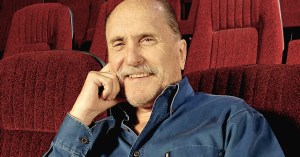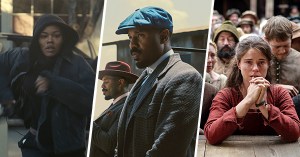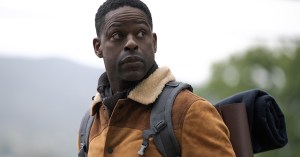RT Interview: Ben Affleck Goes After the Critics for a Change
The actor-turned-director on Gone Baby Gone and his relationship with reviewers.

At age 35, Ben Affleck has achieved a level of stardom and notoriety that’s impossible to ignore. He has consistently appeared in magazine listings of Hollywood’s sexiest, smartest and most powerful people, and he’s been dogged by the paparazzi all the way. Of constant press rumours about his love life, he famously said, “Sometimes it’s Britney Spears, and sometimes it’s Carrie Fisher. I can’t tell if I have a Lolita complex or an Oedipus complex.”
So it’s not surprising that he’s figured out how to live outside the spotlight. After the tabloid hurricane surrounding his relationship with Jennifer Lopez, he sidestepped media hysteria to marry Jennifer Garner in 2005. Following seven Razzie nominations from 1998 to 2004, he quietly returned to the big screen in an award-winning performance as tortured actor George Reeves in Hollywoodland. And after years of playing beefcake heartthrobs, he stepped behind the camera to direct his first feature, Gone Baby Gone, starring his brother Casey.
Of course, this isn’t his first work behind the scenes; after all, his Oscar win was for Good Will Hunting‘s screenplay, written with lifelong friend Matt Damon, who he also teamed with on the three-time Emmy-nominated reality series Project Greenlight.
Over the years, Affleck has clearly learned how to cope with the critics, both good and bad. When RT meets up with him in London, he’s teasing the Brits about the way we say the name of this website. “You say tom-ay-toes, I say tom-ah-toes,” he laughs. “I love that site; I go on there all the time.”
Gone Baby Gone has been certified fresh by RT critics. Does that make you feel any better about the critics who’ve picked on you for other things you’ve done?
Ben Affleck: No, I don’t care. I’m a great believer in the need for and value of honest critics. And I think some are good and honest and some are, you know, less so. But I also think that no matter what it is that you do for a job – whether you’re a writer or you work in any kind of capacity whatsoever – you know when you’ve done something well and when you’ve done it poorly. You don’t need someone else to tell you. You know if you’ve accomplished it. And sometimes if you know you’ve done it poorly and someone else tells you you’ve done it well, you go, “Oh, that’s good!” But you know deep down. Conversely it’s aggravating, because you think, “No, you’re wrong, because this is actually this or that.”

Does it make a difference being criticised as an actor and as a director?
BA: Yeah, I think so, because for me it’s the relationship with the critics. It’s very hard, because movies are really a director’s medium. I mean, in a lot of ways you should mostly be criticising the director. Obviously there’s great acting, and everyone knows it, and there is bad acting. But also, you make choices, you get put in a certain context through editing or writing – a lot of stuff gets sort-of mushed in together, and ultimately it’s sometimes hard to know. Well, where were you as the director? You hired the person! The director is, to me, the person with whom the buck should stop.
Did you enjoy being in that seat?
BA: I loved it, because for me there were a lot of times as an actor where I was so frustrated, saying, “I wish that we were doing X. This is what I think. I think we should do X.” The director wants to do Y, well OK, but that would be madness. I’d say, “Let’s not do Y. Please let’s not do Y!”
Did you have any of these conversations with your brother?
BA: [Laughs] I’m sure; you’d have to ask my brother! My brother’s pretty good and I’m sure there’s definitely stuff that he wanted to do. But the thing that I did as a director, because I appreciated the position that I’d been in, was that I never would straitjacket any actor. My whole approach to directing – if one can be said to have an approach as a director of one movie – is to say, “Let me just afford you the freedom to do what you want to do. Let me give you as much room to do what you want to do as possible. Granted, I have a movie, and it’s going in this direction. This is what the story is, and ultimately the story has to go this way. But you have all the space to do what you want to do, try everything you want to try, take the time, experiment. You want to go play the scene in that room? Go play the scene over there. Or play the scene over here. Find the stuff.” Because the actor will feel it when it’s working and when it’s not working, and the actor will know. And then the actor will be more committed to where it’s working.
So Casey had that leeway of where to go, and ultimately he got to that place. And I knew that he was a really good actor, and I really trusted him, and I knew that he was making my movie better.

But this was definitely your movie.
BA: Talking about critics at the end of the day, if I’m in a movie as an actor and I say, “Look, I thought we were doing one movie, but it turns out we were doing a different movie,” it’s frustrating when somebody says, “Well, I don’t like this movie and it’s your movie.” You know? Well, it’s not my movie! But now with this movie, this is my movie.
The rewarding thing about this for me, even before this movie came out, is that, you know what? If you don’t like this movie, fine. I’m the guy to see. If you like it, I’m the guy to see. It doesn’t matter, and I don’t care. I’m at home with that. I’m at peace with the fact that there are things that I would reshoot about this movie. I’m at peace with the ways in which I feel I f***ed up. And I’m at peace with the fact that there are things that I wanted to do that I like about the movie. You know, ultimately that’s comforting, and I can live with that. And that’s what I’m talking about.






